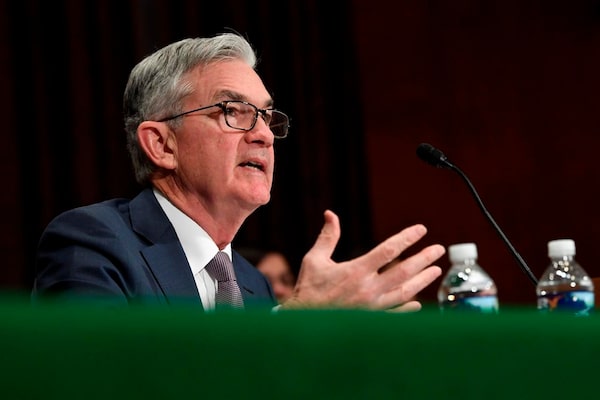
Federal Reserve Chairman Jerome Powell testifies before the Senate Banking Committee on Capitol Hill in Washington, Wednesday, Feb. 12, 2020, during a hearing on the Monetary Policy Report. (AP Photo/Susan Walsh)The Associated Press
Federal Reserve Chair Jerome Powell on Wednesday reiterated his confidence in the U.S. economic outlook, even as he said he expected some drag “soon” from China’s new coronavirus epidemic and called out the threat from income inequality and an expanding federal debt.
“There’s no reason why the current situation of low unemployment, rising wages, high job creation – there’s no reason why it can’t go on,” Powell told the Senate Banking Committee in his second day of congressional testimony.
The record-long U.S. economic expansion is now in its 11th year. U.S. wages are now growing at about a 3 per cent annual pace, the unemployment rate is 3.6 per cent, and job growth has more than kept up with an increase in the workforce.
“There is nothing about this economy that is out of kilter or imbalanced,” Powell said.
His remarks underscored the central bank’s view that its current target range for short-term borrowing costs, between 1.5 per cent and 1.75 per cent, is the right setting to keep the expansion on track.
But he also said the Fed is keeping close tabs on the epidemic of flu-like illness that has killed hundreds and sickened tens of thousands of people since January, nearly all in China.
“We do expect that there will be some effects” on the U.S. economy, Powell said, adding that he expects to begin seeing these reflected in economic data “relatively soon.”
Factory shutdowns and travel restrictions aimed at containing the virus’ spread within China and to the rest of the world are expected to disrupt supply chains.
U.S. exports to China will also be suppressed, he said, as will Chinese tourism to the United States. Financial markets offer another pathway for impact on U.S. growth, he said.
LONGER-TERM ISSUES
Powell also noted a number of areas where the economy’s performance is falling short, including wealth and income inequality, and labor force participation that, while rising, is lower than in many other advanced economies. Asked why, Powell pinned much of the blame on low educational attainment.
And he called out for the second day his concerns about the rise in U.S. debt. “I would say, be concerned now,” he said.
The federal budget’s biggest problem, Powell said, is healthcare spending, which accounts for about 17 per cent of GDP, more than the norm of about 11 per cent in most advanced economies. That’s so even though the benefits themselves are no more generous, and the health outcomes are “perfectly average,” he said.
This year’s federal deficit will hover at around $1 trillion. Though the just-released presidential budget projects a reduction over the next 10 years, it assumes 3 per cent economic growth for years to come, less than the 2 per cent pace estimated by the Congressional Budget Office and by most Fed officials themselves.
If the ratio of debt to GDP continues to grow quickly, Powell said, “what it means is, 20 years from now ...our children will be spending those tax dollars on servicing the debt, rather than on the things they really need.”